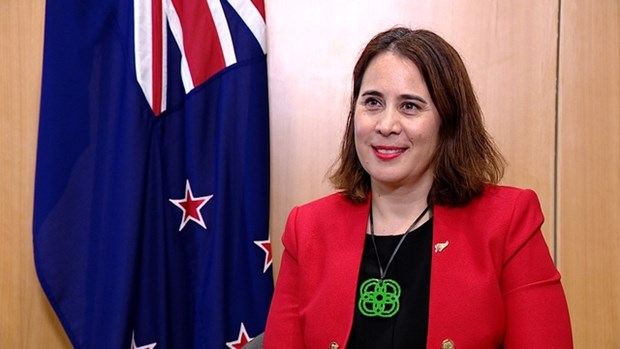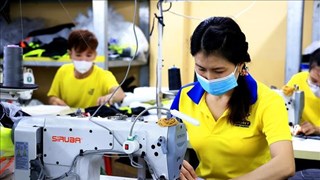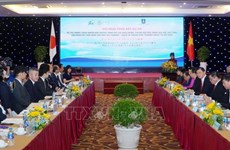NZ Ambassador: PM Ardern’s visit an important opportunity to build on NZ-Vietnam strategic partnership
The visit by Prime Minister Jacinda Ardern is an important opportunity to reaffirm and build on the strategic partnership between New Zealand and Vietnam, NZ Ambassador to Vietnam Tredene Dobson said in an interview granted to the Vietnam News Agency ahead of the visit.
 NZ Ambassador to Vietnam Tredene Dobson (Photo: VGP)
NZ Ambassador to Vietnam Tredene Dobson (Photo: VGP)The following is the full text of the interview.
1.Dear Your Excellency, could you touch on the significance of the upcoming Vietnam official visit by the Prime Minister of New Zealand, the Right Honourable Jacinda Ardern? What does Prime Minister Jacinda Ardern's visit this time aim to promote in the relationship between the two countries?
Prime Minister Ardern’s visit is yet another demonstration of the thriving relationship between NZ and Viet Nam, and its importance to both countries. Along with the visit to New Zealand of Viet Nam’s Minister of Foreign Affairs Bui Thanh Son, one month after New Zealand removed COVID-19 border restrictions, it shows that both countries are committed to maximising the opportunities that were created when they agreed to upgrade the relationship to a Strategic Partnership in 2020.
The Strategic Partnership was itself built upon comprehensive cooperation and achievements in various areas, including trade and economic, agriculture, education, defence and security, development and people-to-people links. The visit is an important opportunity for Prime Minister Ardern to reaffirm and build on this strong foundation.
As both countries emerge from the impacts of COVID-19, the visit is also an important opportunity to re-connect and recover together. To assist with this, Prime Minister Ardern is accompanied by the largest business delegation to visit Viet Nam from New Zealand, with top CEOs and managers looking to open up opportunities for bilateral economic cooperation and, we hope, new opportunities for investment in Viet Nam. Vietnam’s emerging and dynamic market presents new economic opportunities for many New Zealand businesses, building on what is already a significant trade relationship worth over NZ$2.3 billion in two-way trade in the year ending June 2022.
As we recover from COVID-19, the visit is also an opportunity to note both countries are open for tourism growth, having fully reopened up to international travel.
Overall, the visit aims to promote the mutually beneficial nature of the relationship, and advance progress in those areas key areas for cooperation agreed in the Strategic Partnership Framework, and to discuss some of the challenging issues that are facing our region.
2.What are your expectations for this visit? Could you share some impressions on the developments of Viet Nam-New Zealand bilateral relations in recent years? After 2 years of upgrading to a strategic partnership, in your opinion, what are the highlights that the two sides have achieved?
I expect this visit will reaffirm the importance and value of the relationship between New Zealand and Viet Nam, especially as both countries, and the region, recover from COVID-19. The events that we have planned are going to showcase just how strong the relationship is and how it’s delivering benefit for both countries. One example is the AgriconnectioNZ event we have planned which is going to show why Viet Nam and NZ make such natural partners in this important sector, and the way the relationship is bringing real benefit to farmers in both countries. I don’t want to give anything away – but we have a few announcements which I think will make Vietnamese farmers and NZ consumers very happy.
This will be achieved through events that recognise and build on our bilateral cooperation. This includes official talks between both countries’ top leaders, business dialogues and networking, and events that highlight our connections in agriculture, education, tourism and sports.
It sounds like a cliché, but it’s 100% true that in recent years the Viet Nam - New Zealand relationship has gone from strength to strength. In the trade relationship alone, in the past five years two-way trade in goods has increased 59 percent, reaching 2.39 billion NZD by year-end June 2022, making Viet Nam New Zealand’s 15th largest trading partner. In this period, Viet Nam exported 1.36 billion NZD to New Zealand, while New Zealand exported 1.03 billion NZD to Viet Nam. This shows the complementary nature of our trading relationship. For example, where New Zealand has seen around 18% growth in fresh fruit exports to Viet Nam, Viet Nam has grown its machinery exports to New Zealand by more than 30% over the last year.
Many of the events we have planned are designed to showcase the opportunities for exporters in both countries, and to introduce Viet Nam to New Zealand companies that may be looking for new partnerships, including for investment purposes.
I think one of the greatest highlights for me over the last two years is that, despite both countries taking a COVID-19 approach that did not allow travel between the two countries, the relationship has continued to grow in every area. Our people and our businesses, determined to succeed, found ways of working together. Our leaders and Ministers kept up their regular exchanges, albeit virtually. In education, universities and other institutions worked quickly to create and then deliver virtual learning opportunities as well as taking the opportunity to prepare Vietnamese students for when they could travel to New Zealand. Operational and institutional cooperation between our security and defence agencies continued, and as officials we lent in and made sure that every element of the relationship received the support that it needed support.
One other area I really want to highlight is our development cooperation. During times of crisis is when the most vulnerable are most impacted. I am so proud that when that moment came, the strong partnerships and networks we had developed over many years came to the fore. Using these connections, New Zealand has invested nearly 2.2 million NZD since June 2020 in support of Viet Nam’s COVID-19 pandemic response.
Last year, one of our most successful joint projects with Viet Nam came to a conclusion, a project that over 10 years has been a point of pride for both New Zealand and Viet Nam – commercialising new varietals of dragon fruit as well as making giant scientific strides in pest management for the fruit. Now we are excited to be applying the expertise and lessons learned to the development of Viet Nam’s passion fruit industry.
And lastly, I really want to acknowledge how closely our two countries worked together on the pandemic response. We shared a lot of knowledge and experience to support pandemic response policy; we worked closely together regionally, especially through APEC to support supply chain efficiency for vaccines, medicines and PPE; a NZ company, Fisher and Paykel Healthcare made a private donation to a number of hospitals for the latest technology in airflow to avoid putting patients on ventilators; and of course we provided vaccine support through the COVAX Vaccine facility.
Due to COVID, the past two years have proved challenging for all countries. However, the Viet Nam – New Zealand Strategic Partnership put our countries in a strong position to continue building on the relationship.
 New Zealand business representatives present fruit to children in Ho Chi Minh City. (Photo: VNA)
New Zealand business representatives present fruit to children in Ho Chi Minh City. (Photo: VNA)Viet Nam and New Zealand have the advantage of sharing three major free trade agreements (CPTPP, AANZFTA and RCEP), as well as working together across regional architecture (APEC, ASEAN/EAS and ASEM), and most recently the Indo-Pacific Economic Framework. These deep bilateral and regional economic connections will ensure the maintenance of supply chains and reduce barriers to international trade.
New Zealand is a free and open market – we know it is in our interests to take advantage of the products, skills and expertise offered by our trade partners, especially where they have a competitive advantage. And Viet Nam, with its renowned manufacturing capability, offers exactly that. Vietnamese exporters clearly know that. Despite New Zealand’s small population of only five million, compared to Viet Nam’s 98 million, Viet Nam actually enjoys a trade surplus in New Zealand.
I would like to see even more business-to-business collaboration happening, and I will be looking at how we can best support that during my tenure in Viet Nam. For example, there are good opportunities for New Zealand and Viet Nam to collaborate where we share trade relationships, market access, and trade deals - such as with the European Union. As Viet Nam strives to move further up the global value chain, New Zealand businesses are also well positioned to provide intermediate inputs into Viet Nam’s manufacturing capacity. So whether its New Zealand timber that is used to manufacture furniture in Viet Nam before being exported to the European Union, or just Vietnamese enterprises looking to broaden their markets, exports, and joining new supply chains in the region – our close economic ties, common standards, and our shared vision of free and open economic integration provides a strong platform for growth.
I would say, based on my experience of working alongside New Zealand Trade and Enterprise to support New Zealand business in Viet Nam, how important it is to know your consumer market and to adjust accordingly. For example, NZTE’s Made with Care campaign, which was developed specifically for the Viet Nam market, highlights what’s important for Vietnamese consumers, i.e. high quality, safe, nutritious and ethical food and beverage products. Viet Nam has a trade office in New Zealand and I would strongly recommend Vietnamese businesses interested in the New Zealand market, to gett advice from them. They are best placed to give that advice from the Vietnamese perspective.
If we collectively begin to realise the enormous potential for New Zealand and Vietnamese businesses to increase business collaboration, strengthen investment, and grow our complementary trade relationship, we will not only meet the target of 2 billion USD (3.2 billion NZD) two-way trade by 2024, we will exceed it.
4.Will Prime Minister Jacinda Ardern's visit this time open up new prospects for cooperation between the two countries?
Meetings with all top four leaders of Viet Nam will help the two sides continue to build trust, share mutual understanding and reaffirm commitments, and build on areas of common interest. This will absolutely result in further cooperation between the two sides. Furthermore, activities between both countries’ business delegations, with the presence of PM Jacinda Ardern and policy makers from Viet Nam and New Zealand, will help to establish meaningful connections, discuss ways to promote bilateral trade, uncover opportunities that are mutually beneficial, and identify how to capitalise on them.
There are some really great developments, and we’ve also been working hard to refresh prior arrangements so that they can take account of new development and opportunities, but that is for our Prime Ministers to share.
One area we can expect our leaders to look hard at in terms of opportunities for collaboration is climate change. The visit will occur in the context of COP27 and, following the ambitious commitments made by our two countries at COP26 and previously, there are absolutely opportunities to work closer together. We are already making progress in the agriculture sector and I think carbon markets are another area ripe for collaboration.
5.In addition to cooperation in education and agriculture, another area that was also mentioned at the Vietnam - New Zealand foreign ministers' meeting in September was cooperation on security - defense. Can you provide more details about cooperation in this field in the past and in the future?
The relationship has seen strong momentum recently in defence and security cooperation between our two countries. This includes the effective implementation of the New Zealand-Viet Nam Peacekeeping Operations Training and Cooperation Implementing Arrangement, and regular high-level defence exchanges in both directions, signal our strengthening defence relations.
We are also working hard to build upon the 2019 arrangement between the Ministry of Public Security of Viet Nam and New Zealand Police on countering transnational crimes through regular information exchanges, and training programmes on anti-money laundering and anti-human trafficking and smuggling.
Both sides also cooperate closely in both bilateral and multilateral mechanisms on maritime security and safety to promote respect for and adherence to the United Nations Convention on the Law of the Sea 1982 (UNCLOS). Efforts focus on freedom of navigation and overflight in the region in order to promote unimpeded commerce, mutual trust and confidence, and the peaceful resolution of disputes, including disputes in the South China Sea, in accordance with international law, particularly UNCLOS, and with full respect to the diplomatic and legal process./.













